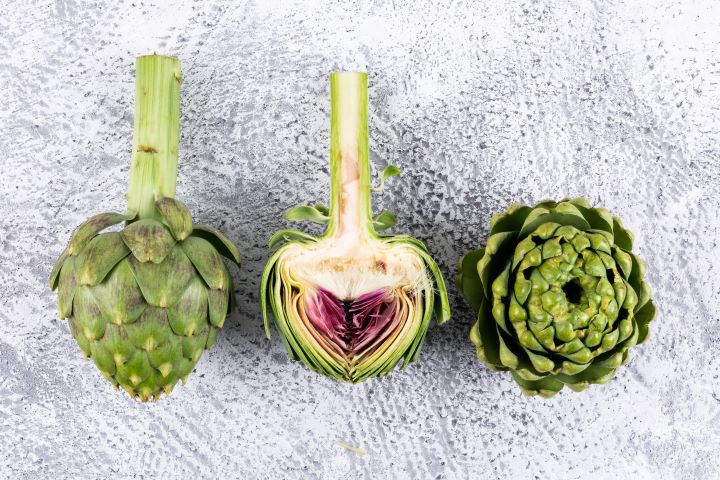Artichoke, a flower bud of a thistle plant, is a delicious and nutritious vegetable. The artichoke plant consists of spiky stalks, leaves, and a large flower bud. The flower bud of this plant is edible and is often eaten as a culinary delicacy. The artichoke bud is picked before the flower has time to bloom. This plant is native to the Mediterranean region and is now cultivated commercially in America as well. It has been used in the Mediterranean region for its medicinal qualities for centuries. It is a powerhouse of nutrients that provides various health benefits. In this article, we will explore the nutritional profile of artichoke, its health benefits, how to consume it, and whether it is keto-friendly or not.
In This Article:
- Nutritional Profile of Artichoke
- Health Benefits of Artichoke
- How Do I Consume?
- Is I Keto-Friendly?
- Dietary Restrictions
Nutritional Profile of Artichoke
Artichoke is low in calories and high in fiber, making it an excellent choice for those looking to lose weight or maintain a healthy weight. One medium-sized artichoke contains only 60 calories and 7 grams of dietary fiber. It is also an excellent source of vitamin C, vitamin K, folate, potassium, and magnesium. Artichoke is rich in antioxidants and has a lot of health benefits. If you are a health-conscious person, then this plant is a great addition to your diet.
Health Benefits of Artichoke
Artichoke is packed with nutrients and health benefits, which make it a food worth consuming. Let’s discuss seven such health benefits of artichoke that might just compell you to incorporate this incredible flower bud into your lifestyle:
Promotes Digestive Health
The high fibre content in artichoke promotes digestive health by preventing constipation and promoting regular bowel movements. Artichoke also contains a prebiotic called inulin, which feeds the beneficial bacteria in your gut, promoting a healthy gut microbiome.
Lowers Cholesterol
Artichoke contains compounds called cynaropicrin and chlorogenic acid, which can lower cholesterol levels by reducing the production of cholesterol in the liver. The rich fibre content of artichoke helps lower bad cholesterol levels in the body and, in turn, supports heart health.
Supports Liver Health
Artichoke contains compounds like cynarin and silymarin that can help improve liver function by increasing the production of bile, which aids in digestion and the elimination of toxins from the liver. Artichoke can significantly improve liver function in people with nonalcoholic fatty liver disease.
Regulates Blood Sugar
Artichoke contains a compound called cynarin, which can help regulate blood sugar levels by increasing insulin sensitivity. The rich, high fibre content of artichoke slows down the absorption of sugar in the body, thus helping to lower blood sugar levels.
Boosts The Immune System
The high vitamin C content in artichoke can boost the immune system by increasing the production of white blood cells, which fight off infection and disease. In fact, the Journal of Agriculture and Food Chemistry has ranked artichoke as one of the best immune-boosting foods.
Promotes Bone Health
Artichoke is a good source of vitamin K, which plays a vital role in bone health by increasing bone density and reducing the risk of fractures. This vitamin also plays an important role in blood clotting and wound healing.
Anti-Inflammatory Properties
Artichoke contains antioxidants and anti-inflammatory compounds that can help suppress and reduce inflammation in the body, which is associated with allergies, asthma, and various other health problems such as arthritis, heart disease, and even cancer.
How Do I Consume?
Artichoke can be consumed in various ways, such as steamed, boiled, roasted, grilled, or even raw. The most common way to consume artichoke is by removing the outer leaves and steaming or boiling the rest of the artichoke until tender. Then, remove the fuzzy choke and eat the remaining tender heart and stem of the flower bud. You can also dip the leaves in a healthy dip such as hummus or baba ghanoush for added flavour.
Is It Keto-Friendly?
Artichoke is a very keto-friendly vegetable, as it is low in carbs and high in fiber. One medium-sized artichoke contains only 14 grams of carbs, of which 7 grams are fiber, making it a great choice for those following a ketogenic diet.
Dietary Restrictions
Artichoke is generally safe for consumption for most people. However, some people may be allergic to artichoke or have a sensitivity to it. People who are allergic to plants such as marigolds, ragweed, daisies, and other similar herbs are at higher risk of developing allergic reactions to artichoke. Also, people who have bile duct blockages should stay away from consuming artichoke. In the case of gallstones, one should exercise caution because artichoke may just deteriorate your condition. If you experience any adverse reactions, such as itching, swelling, or difficulty breathing, stop consuming artichoke and seek medical attention immediately.
Eating artichokes as a pregnant woman can be beneficial and help in better supply of antioxidants such as choline to the body, resulting in healthy development of the fetus. However, before incorporating any food during pregnancy, it is important to talk to a health professional about the possible risks. So, consult a doctor before including artichoke in your diet.
Conclusion:
In conclusion, artichoke is a healthy and delicious vegetable that provides various health benefits. It is low in calories, high in fibre, and packed with essential vitamins and minerals. Its health benefits range from supporting digestive and liver health to boosting the immune system and promoting bone health. Its versatility in culinary applications, whether steamed, grilled, or raw, makes it a great addition to any diet. Furthermore, its compatibility with various dietary preferences, including its keto-friendly nature, underscores its appeal to a wide range of individuals seeking to optimise their health through mindful eating. However, it’s important to note potential allergens and dietary restrictions, ensuring safe consumption for everyone. By incorporating artichoke into your diet, you can improve your digestive health, regulate blood sugar, boost your immune system, and promote bone health, among other benefits. So, go ahead and give this often-overlooked vegetable a try and reap the benefits it has to offer.
Sources:
- https://www.healthline.com/nutrition/artichoke-benefits
- https://www.webmd.com/diet/health-benefits-artichokes
3. https://www.health.com/nutrition/artichoke-health-benefits













